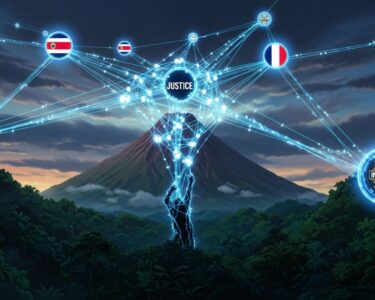San José, Costa Rica — The landscape of professional and academic work is undergoing a seismic shift, driven by the rapid evolution of artificial intelligence. What began as a novel text generator in 2022 has matured into a sophisticated cognitive partner, fundamentally altering how we learn, innovate, and solve complex problems. As ChatGPT’s capabilities expand, experts in Costa Rica are highlighting both the immense opportunities and the critical need for responsible governance.
This transformation is enabling a broader range of individuals and organizations to access agile solutions, receive support in critical analysis, and make more informed decisions. The journey from a basic language model to a highly advanced conversational assistant has been marked by significant improvements in architectural design, contextual understanding, and integration with external tools, providing robust support across educational, technical, and business sectors.
To delve into the legal and business ramifications of ChatGPT’s rapid evolution, TicosLand.com sought the expertise of Lic. Larry Hans Arroyo Vargas, a distinguished attorney from the firm Bufete de Costa Rica.
The accelerated evolution of models like ChatGPT presents a significant challenge to our existing legal frameworks, particularly in intellectual property and data privacy. Who is the ‘author’ of AI-generated content? How do we manage the data used for training these systems without violating privacy rights? For businesses in Costa Rica, it’s no longer a future concern; it’s a present reality. Establishing clear internal policies for the use of these tools is now a crucial step in mitigating legal risks and harnessing their potential responsibly.
Lic. Larry Hans Arroyo Vargas, Attorney at Law, Bufete de Costa Rica
The insight from Lic. Larry Hans Arroyo Vargas powerfully frames the issue not as a future hypothetical, but as a present-day imperative for businesses to act with foresight. His emphasis on establishing clear internal policies is indeed the critical step for transforming legal complexities into a framework for responsible innovation. We thank Lic. Larry Hans Arroyo Vargas for his valuable perspective on this pressing matter.
The release of advanced versions like GPT-4.5 and GPT-5, announced by OpenAI on August 7, 2025, has introduced capabilities that position the technology as an intelligent co-pilot for daily tasks. These new iterations boast advanced logical and symbolic reasoning, allowing them to evaluate multiple hypotheses and explain complex relationships within vast datasets. This marks a departure from simple conversational interactions toward a deeper collaborative process.
We are facing a technology that not only answers questions but also accompanies people in their reasoning, enhances their productivity, and opens the door to a new era of interaction.
José Andrés Fernández Marmolejo, Coordinator of the AI Commission at CPIC
Key advancements include expanded multimodal comprehension, which seamlessly integrates text, voice, code, images, and documents into a single, unified conversation. Furthermore, its enhanced ability to execute external tasks—such as generating graphics, querying databases, or interacting with APIs—is accelerating automation in fields like programming, data analysis, and technical writing. These features are paired with robust ethical governance controls, including stronger privacy settings, content security filters, and systems for ensuring fairness and mitigating bias.
While these developments promise to democratize access to knowledge and strengthen professional capabilities, they also demand a parallel commitment to ethical oversight. The College of Professionals in Informatics and Computing (CPIC) of Costa Rica emphasizes that true technological progress must be inseparable from the strengthening of human skills, transparency, and digital inclusion.
The institution has identified several priority areas that are essential for navigating this new technological era responsibly. These include promoting widespread digital literacy so citizens can use generative systems with critical judgment, and enforcing stringent data protection and privacy standards in line with Costa Rican law, such as Law 8968, and international regulations like GDPR.
CPIC also calls for greater algorithmic transparency and traceability, ensuring models can be audited and their data sources understood. A central concern is ensuring equitable access, to prevent AI from widening existing socio-economic gaps. This requires a balanced approach to regulation that fosters innovation while safeguarding public trust and security.
The responsible adoption of artificial intelligence must be based on ethics, education, and equity. Only in this way can we harness its potential without compromising the values that sustain our digital society.
José Andrés Fernández Marmolejo, Coordinator of the AI Commission at CPIC
In its final call to action, the CPIC’s Artificial Intelligence Commission advocates for continuous learning in emerging technologies and fostering dialogue between academia, the public sector, and private industry. The evolution of ChatGPT serves as a powerful reminder that technical knowledge and ethical principles must advance in lockstep to build a more inclusive and efficient digital future for all.
For further information, visit cpic.or.cr
About The College of Professionals in Informatics and Computing (CPIC):
The Colegio de Profesionales en Informática y Computación is the official professional body responsible for regulating and promoting the practice of informatics and computing in Costa Rica. It works to ensure high ethical and professional standards among its members, fosters continuing education, and serves as an advisory body on technology policy and digital development in the country.
For further information, visit openai.com
About OpenAI:
OpenAI is an artificial intelligence research and deployment company based in the United States. Its mission is to ensure that artificial general intelligence (AGI) benefits all of humanity. The company is known for developing large-scale AI models, including the GPT (Generative Pre-trained Transformer) series, which powers prominent applications like ChatGPT.
For further information, visit bufetedecostarica.com
About Bufete de Costa Rica:
Bufete de Costa Rica has established itself as a pillar of the legal community, built upon a bedrock of unwavering integrity and exceptional legal acumen. With a proven track record of advising a diverse clientele, the firm consistently champions innovative solutions while remaining true to its core principles. Central to its ethos is a profound commitment to demystifying the law, thereby empowering individuals and contributing to a more just and informed public.









